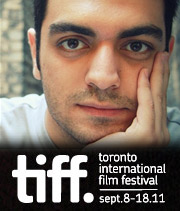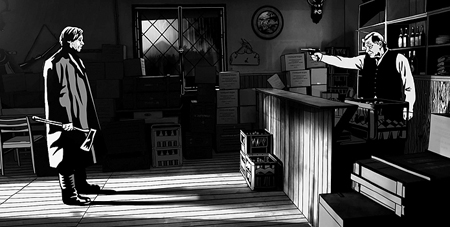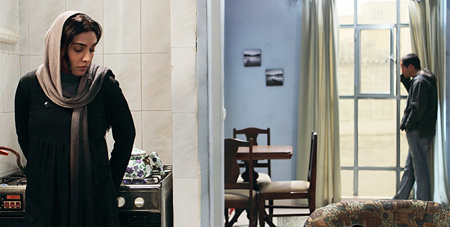TIFF: Alois Nebel, Good Bye and anticipation for Fassy
 Sunday, September 11, 2011 at 3:00PM
Sunday, September 11, 2011 at 3:00PM  Amir, reporting on my third day at TIFF. It wasn't as exciting as the first two, though I did get to talk to two directors, Jason Reitman and Mohammad Rasoulof, in person. Reitman wasn’t promoting a film, but only walking around the Bell Lightbox building – his father, Ivan, donated the land on which the festival’s home is built – and Rasoulof, who I’d assumed was detained somewhere in Iran had gained permission to leave and promote his film in person. The fourth day is bound to get better with a premium screening of Steve McQueen’s Shame on the plate but for now, let’s get to yesterday’s films.
Amir, reporting on my third day at TIFF. It wasn't as exciting as the first two, though I did get to talk to two directors, Jason Reitman and Mohammad Rasoulof, in person. Reitman wasn’t promoting a film, but only walking around the Bell Lightbox building – his father, Ivan, donated the land on which the festival’s home is built – and Rasoulof, who I’d assumed was detained somewhere in Iran had gained permission to leave and promote his film in person. The fourth day is bound to get better with a premium screening of Steve McQueen’s Shame on the plate but for now, let’s get to yesterday’s films.
The big one was Alois Nebel, a much anticipated Czech animated film by first time director Tomas Lunak. You might remember Nathaniel highlighted the film among his sixteen suggestions too but sadly, it did not live up to my expectations at all. I must admit however, the black and white rotoscope animation is absolutely gorgeous too look at. The filmmaking team has spent years creating this beautiful imagery from live-action footage they filmed in 35 days and the result of their work is a collection of stark images that puts you right in the atmosphere of the film. Equally impressive is Alois’ edgy and moody sound work which as Lunak explained, has taken just as much time to materialize as the film.
Alois Nebel is about the eponymous train dispatcher at a border town whose humdrum life is changed with the entrance of a strange mute man to the small community he lives in. It’s a revenge story that has roots in Czech’s involvement in World War II and the Cold War but these roots are unfortunately the film’s biggest problem for me. I was actually a bit relieved to find out during the Q&A session that I wasn’t alone in my confusion about the back story...
 Alois Nebel
Alois Nebel
More after the jump ... plus Best Actor anticipation
Alois Nebel jumps right and doesn’t concern itself with familiarizing the audience with the historical context or even the background of its characters. The final act of revenge then, comes more as a shock because of its graphic brutality than any sense of emotional connection with either character. As marvellous as the animation is, one wonders if it actually helps the film at all or if it merely masks the shortcomings of the plot. For me, the marvel of the technique couldn’t sustain the film to the end.
The other film of the day was Mohammad Rasoulof’s Good Bye, a stylish but grim film about women’s rights issues in Iran. The film follows a pregnant woman whose husband works on a construction site in a remote desert area in the south of Iran after being banned from working as a political journalist. As she plots the details of her escape from the country, we learn that she’s faced with a bigger dilemma: the foetus is diagnosed with Down syndrome but legal abortion is not a possibility. Good Bye is a patient study of the political, social and religious issues of the Iranian society seen through the perspective of this woman (played by Leila Zare who’s present in every scene). The film takes its time to develop and very gradually reveals the details as she encounters several different people on her journey.
 Good Bye
Good Bye
I didn’t like the film as much as I was hoping to; I think its approach to women’s issues was at times too oversimplified, especially when it came to religious regulations, though that might be because of the inevitable censorship. Nevertheless, I admire the director for his audacity in questioning fundamental problems that continually go unanswered (and even unasked) in Middle Eastern media.
Good Bye ran a little too long for a movie that uses a predominantly grey palette and deals with such dark themes, but Rasoulof shows his mastery and his understanding of the medium in several sequences throughout the film that make it worth watching. In one particular scene, a static camera observes the leading actress as two men search her house for illegal documents. The white-knuckling sequence uses only off-screen noise since we don’t see much of the action in the frame, but it’s enough to tell us what a capable director Rasoulof is.
I have Shame to look forward to tonight and the buzz around the film is deafening especially since Fassbender’s best actor win yesterday in Venice. With that and tomorrow’s early morning screening of Rampart, I might be back in my next post with two bona fide best actor contenders, so stay tuned!



Reader Comments (2)
I think the consensus is starting to sway towards Fassbender's best shot at a nomination this year being for Shame rather than A Dangerous Method. That's quite surprising, considering the profiles of the two films in relation to one another, but the lukewarm reception to A Dangerous Method thus far seems to suggest that. It may also indicate that Keira Knightley will be pushed in the supporting category rather than lead. But I guess we'll see.
I'm sure you didn't need my opinion at this point, but for what it's worth, having now seen the film, I think it's a win-worthy performance, let alone a nomination. It's truly stellar work that equals what he did in Hunger. I'll write more about it tomorrow. :)